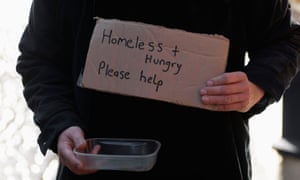Dawn Foster
Giving your spare change to a homeless person can provide a fleeting escape for those in miserable circumstances

A homeless person begging on the street Coventry UK
Many
charities warn against giving money to people begging, but this can be
hard when faced with someone in need. Photograph: John Robertson/Alamy
Friday 15 April 2016
Recently,
as a friend and I passed a homeless person on the street and gave her a
handful of coins from our pockets, my friend asked: “Is it OK to give
to homeless people on the street?”
It’s rare to walk more than a
few minutes in London without someone asking for spare change. People
tend to make one of three decisions: rummage in the depths of a coat
pocket; smile apologetically and say they have no cash; or harden their
expression and look away. Many charities warn against giving money to
people begging and advise, instead, to give regularly to specified
charities.
That approach may make sense on a macro level but, as
my friend pointed out, we’re human and, faced with an individual
explaining they’re in need, it’s difficult not to give. It’s for this
reason that Nottingham city council has come in for harsh criticism in
the past few weeks. Around the city, adverts funded by the local
authority have popped up on bins and bus stops warning people not to
“give to fraud”; that homeless people are often alcoholics, drug users,
or not as needy as they seem.
Framework, a charity and housing
association that works to prevent homelessness in Nottingham, described
the campaign as “provocative but accurate”, pointing out that many
people begging in Nottingham are known to them, lead chaotic lives, and
often refuse accommodation because they can make more money begging. But
many residents point out that the campaign contributes to a growing
stigma against homeless people and, coming at a time when homelessness
services are being cut in Nottingham, is hypocritical and a poor use of
funds. Framework has reported that it will be forced to close some
services because the council has not renewed funding.
The
rate of homelessness has rocketed in the past six years: the
government’s most recent rough sleeping statistics report 3,569 people
sleeping on the streets in England in autumn 2015, up 825 (30%) from the
total of 2,744 in autumn 2014. At the same time, homelessness services
around the country are facing cuts and closures. Homelessness charities
are in crisis and, in turn, homeless people are suffering. Adding to the
stigma does nothing to help this, but rather confirms the suspicion
that many homeless people wouldn’t be homeless if they “took control” of
their lives.
Not
everyone who begs is a drug addict, an alcoholic, or a fraud, and even
if they are, we must not lose sight of our common humanity. A
psychiatrist I know speaks to homeless people outside supermarkets, and
offers to buy them anything they’d like from inside. She’s never been
asked for a can of beer or cider, but the requests floor her. Some
people ask for a sandwich, but mostly it’s requests for hot chocolate,
specific chocolate bars, something to provide a small fleeting pleasure.
“I just want something nice for once,” one man told her.
Unless
you know your spare change will go straight to propping up someone’s
habit, then giving it to a homeless person is a small act that can
provide that fleeting escape for people in truly miserable
circumstances. A hostel may be better, but their doors are closing and
beds are often taken. You can give someone the change in your pocket and
still set up a monthly direct debit to one of the many homelessness
charities around the country: it’s not an either/or decision.
If
I’ve had a gruelling day I’ll pour myself a glass of wine when I get
back to my warm, stable home. If I were homeless, that small stab at
release and happiness would be no less important, emotionally. Giving to
homeless people is an act of empathy resisting the tide of opprobrium
hitting them. Occasionally giving away your change shouldn’t be a source
of guilt. But without government funding, homeless people’s lives will
only get worse, and their chances of finding a home dwindle even more.
If I were in that position, I would definitely need that glass of wine.
Join
the Guardian Housing Network to read more pieces like this. Follow us
on Twitter (@GuardianHousing) and like us on Facebook to keep up with
the latest social housing news and views.

No comments:
Post a Comment